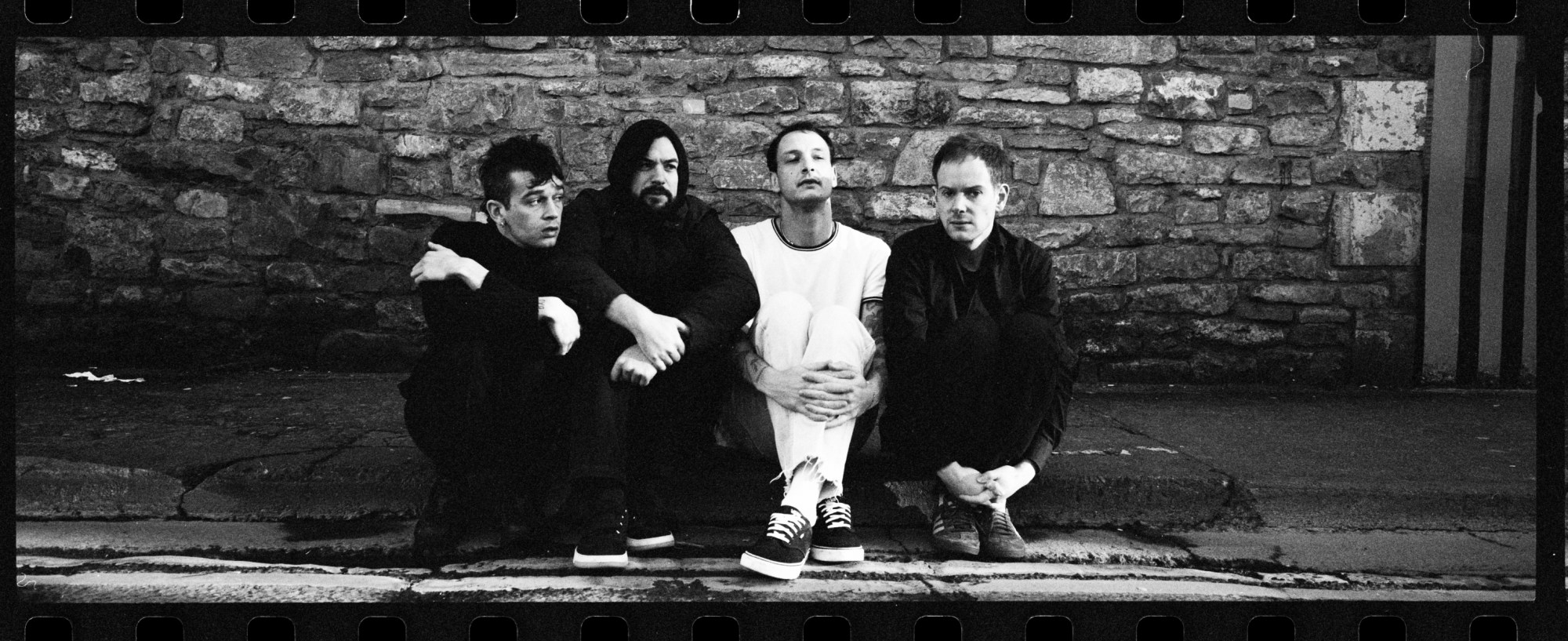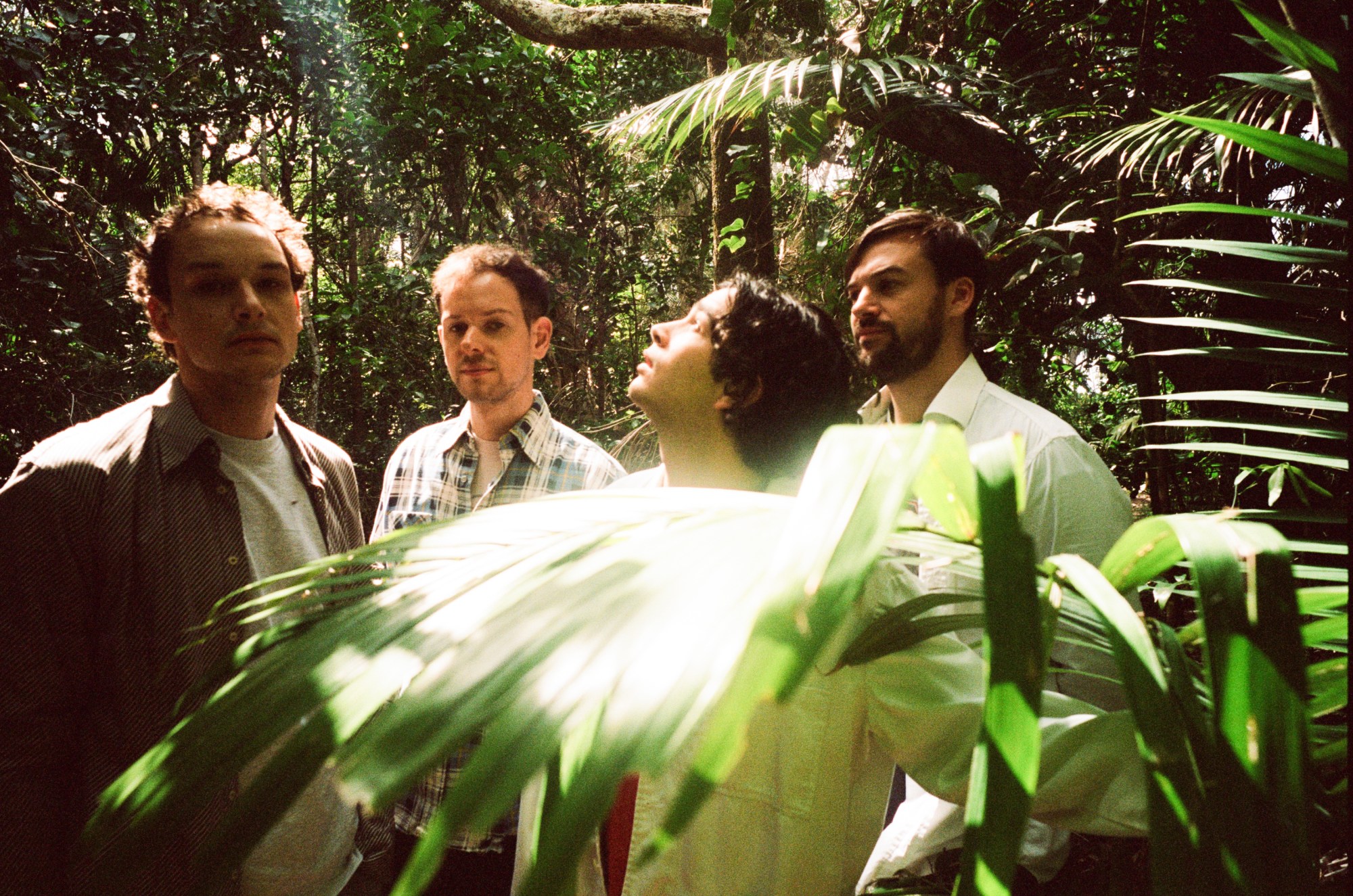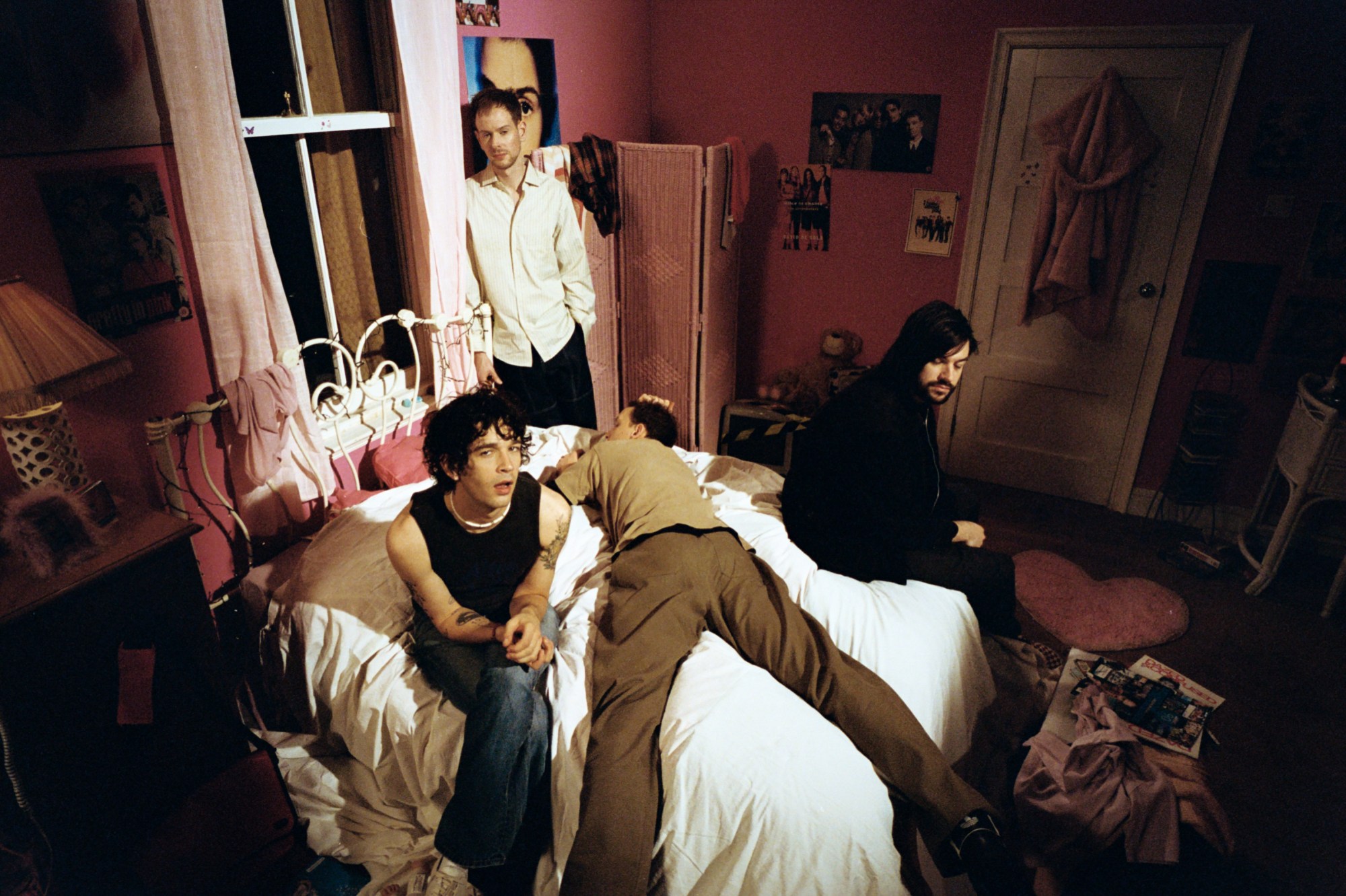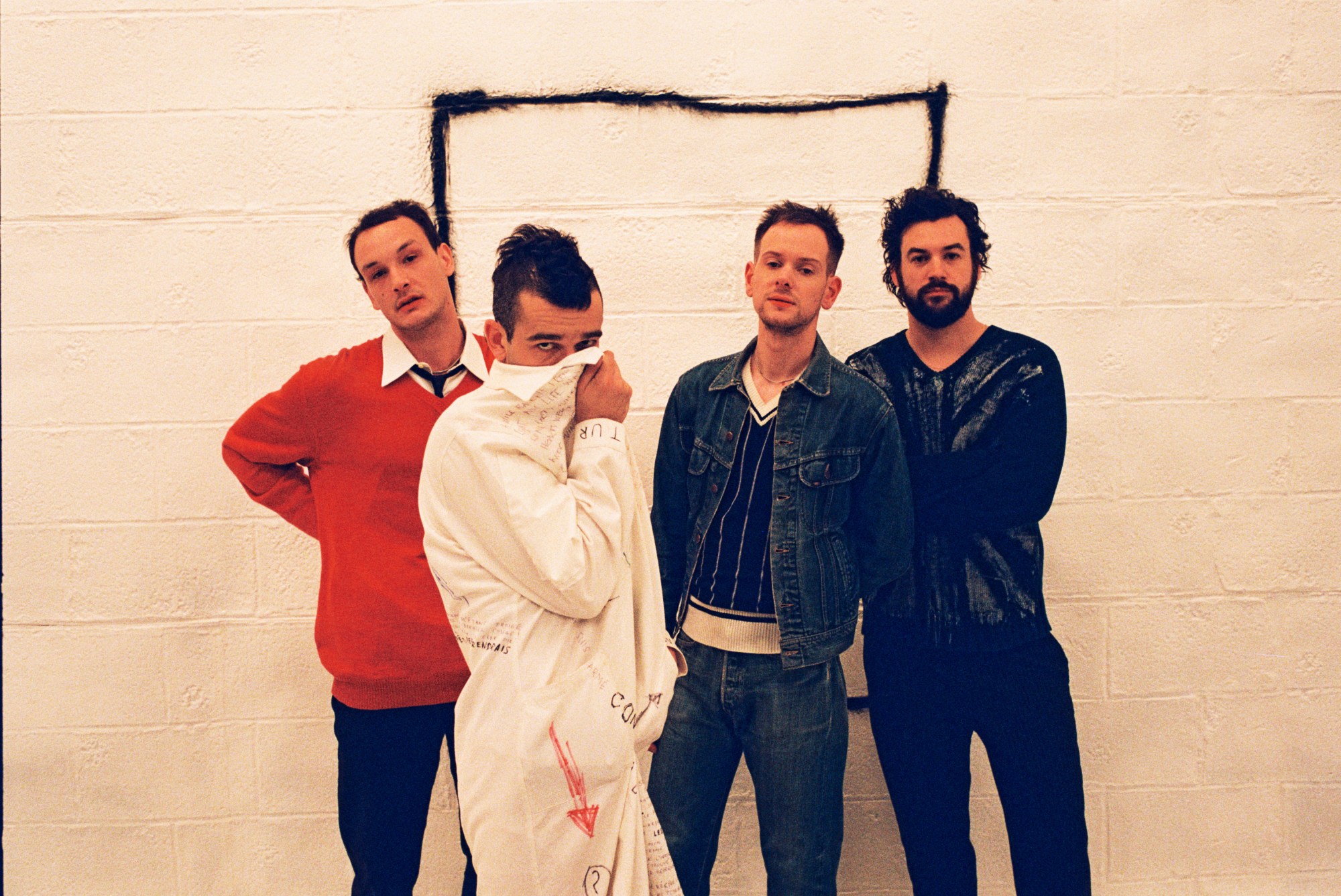Matty Healy picks up our video call in a two-piece pinstripe suit, smoking a joint. It’s a Monday and it’s just gone midday. The world’s most talked-about modern frontman is holed up in a house-slash-music studio in the countryside with his dog. In 11 days, Notes On A Conditional Form, the new record by his band The 1975 will be released. “Fucking hell,” he says, considering the countdown. “It feels like it’s taken forever.”
Notes on a Conditional Form is the fourth album by a group who have famously skirted definition and pigeonholing. They are a pop band but they’re not. Matty Healy is a rockstar but he isn’t really. The expectations of what sonic world they will explore next are limited only to their tendency to be endlessly unpredictable. This record speaks to that. 22 tracks long and stretching out over 80 minutes, it’s a far cry from the high impact, blink-and-you’ll-miss-it pop albums of today. Instead, it’s something their millions-strong fanbase from around the world will live inside and explore. A dozen rotations in, and you’ll still be discovering things that are present but hidden on your first listen.

Each song acts as a skittish red herring for whatever follows it. It switches from spoken word to screamo, folk ballad to dancehall. To call it an experiment would be untrue; an experiment exists to prove a hypothesis. The 1975, in their eyes, don’t have anything to prove: “Instead of looking out and seeing what everyone thinks,” Matty says, “[we went] home and made the weird records we enjoy making.”
The follow-up to their critically-acclaimed 2018 effort A Brief Inquiry to Online Relationships focuses on the anxieties and hallmarks of life in the here and now: FaceTime sex; an unfurling ecological disaster; addiction; getting canceled online. The latter subject Matty is used to by now. As much as he’s an enigmatic deity to a million teenagers around the world, he’s vocal, perhaps too vocal, and acts on instinct. His intentions seem good, but often feel skewed and questionable once they’ve left his mouth. He’s been criticised for making jokes about independent musicians calling out for support during the pandemic. He kissed a boy in the crowd at the band’s Dubai show, prompting a debate about the safety of the band’s queer fans in a staunchly anti-LGBT country. (He’s since spoken to the boy, who left the show afterwards and went on to have “the best night of his life”, according to a recent interview.) His comments on being able to criticise religion have gone viral online.

But Matty Healy, frequently framed by his naysayers as a narcissist (though you imagine he’d admit to possessing at least some flecks of that sensibility), is now ruminating on life without a crowd to perform to. The present and future look fascinating for a band whose artform is deeply intertwined with both IRL and online stan culture, one that’s taken them from pubs to international arenas in the past decade. So over the course of an hour-long conversation, Matty spoke to us about that, as well as Notes on a Conditional Form, wrestling with ‘wokeness’, and his endless appreciation of queer culture.
I wanted to start by going back nine months to when you first announced that the record that’s since become Notes on a Conditional Form was going to be 22 tracks long. Did you have an idea of what those 22 tracks would sound like?
Not at all. That’s why it was kind of terrifying. When you’re staring at an empty record, it does feel like you have your mortal skillset and that you’re going to apply it to something, but that’s just not what creating stuff is like. You turn up. Something interesting happens, and before you even think about it, you’re making something.
Did the positive response to A Brief Inquiry Into Online Relationships make this a far more intimidating project?
I don’t know. By the time we’d made I Like It When You Sleep… [the band’s 2016 sophomore album], we were a bit like, fuck it, we’re happy doing what we do. So we made this record with a no-fucks-given perspective. That’s the only formula we’ve had to cling onto. The records don’t have a blueprint. They’re not successful because they sound like this or that. The only [rule] is just keep being fucking excited. Keep trying to be teenagers in a room.
There was a lot that was said about how [Brief Inquiry] was striving to be bold, adventurous, or whatever it was. I suppose it is that, because that’s what excites us, but it’s less about striving to be bold and more about avoiding being bored. Eighteen years into a band and 10 years into a career, we’re only doing it because we love it. There would be no point otherwise.

Your attitudes towards that acclaim have shifted over the years. Do you consider your audience, your fanbase, when you’re making a record still?
It’s all about instinct. I was watching Blue Velvet the other night, and was reading about David Lynch. He has this amazing thing where [someone asks him] ‘How do you make your movies look like that?’ He says, ‘I read the script, the first thing I think of, I write down, and then I go to the set and I film that’. His point is that he doesn’t have a David Lynch book of what to do. His instinct is what his audience is going to resonate with. Learning that is hard. Having the confidence to be relaxed about it, and understanding that your instincts are your art will always be the truest thing, and that’s what people relate to. So no, we’ve never thought ‘this is not very Pitchfork-y!’ I mean, fucking hell. If you opened up those doors, it would be fucking crazy.
Has the success of “If You’re Too Shy” come as a surprise then? It’s a 1975 song that’s getting played on the radio. Does that kind of commercial success make you feel like more of a pop star?
Everything I wouldn’t ignore for my other artists [Matty is the creative director of Dirty Hit, with a roster that includes beabadoobee and No Rome], I ignore for The 1975: statistics, charts… Everyone’s saying ‘This is your highest charting single!’. I had to ask people what the one before that was because I didn’t even know. That shit really doesn’t interest me. To make myself interested in that feels false. Because I’d constantly be trying to quantify what I love doing.
But I’m loads of things, aren’t I? I can’t have songs like “Too Shy” and not be in a pop band. We all have this dilemma! I’m just a good example of it. The search for the definitive self. I deal with that in a very open, musical way. I’ve had to try and forget about it.
Do you feel like you prescribe to the stereotypical characteristics of a frontman?
Do you think that I do?
In terms of attitude, I’d say so. There aren’t very many, in a contemporary context, who are genuinely interesting.
I am a product of post-modern set-up. So all of these structures that we can hang stuff on, I always take the piss out of. There’s always this idea that I know that you think that I think that I’m Jim Morrison.
Right…
But I know that you think that I think that I’m Jim Morrison, but I know that I’m not. So now we have this game of, fucking, hip gyrating and then genuinely apologising for it. [Followed by] earnest, true statements where I’m being as real as I can be, and then having a fucking flashing Matty sign behind me [on stage]. That ridiculousness, and the elephants in the room are always the things that I find the most interesting. Everything apart from the music is ridiculous, because we all know too much.
You’re obviously the main voice for the band, but the relationship between yourself and George Daniel [the band’s producer and drummer] seems to be symbiotic. How much did your moods and attitudes align in the process of making the record?
It sounds like a pretentious thing to say, but I suppose because we’ve got a shared musical vocabulary. Even if we’re both working remotely, we’re both working together. There’s never an idea I bring to George and it’s like [he mimics a dumbfounded reaction]. It doesn’t happen! We have a natural reaction to what each other is doing. But you’ve got to carry yourself at different times. It is very symbiotic. It’s weird to separate the two.
Was there ever a day you thought would be shitty and unproductive that actually produced something good?
Mate, I can’t remember fucking days. Every Friday I’d cancel the album. Jamie, our manager, would come and we’d sit down and listen to it and I’d be like ‘It’s shit. Fuck this’, but I kind of do that to make everyone else go, ‘No Matty, it’s great, you’re really clever’ , to make myself feel better. We’re just our harshest critics.
I wanted to ask about the collaborations on the record. Have you identified a throughline that connects them all?
The Phoebe [Bridgers] stuff was all because we were big fans of each other, and I was in LA at the same time as her. I didn’t think, ‘Ooh, we should do a feature for the first time!’, I just thought her voice would be really nice on it. When I think of America, I hear her voice. The same with Twigs. We had that part [in “If You’re Too Shy”] that was a sample from an opera song, and we’re at that stage now where we can hit up the best fucking pop opera singer in the world and she’s like ‘Yeah, sure’.
I don’t really like features that much, unless it’s a real collaboration. People are quite suspicious of it. There’s a desire for a cross pollination of streams where like, Feed-Chain-smo… – whatever I’m not gonna slag other bands off, I get cancelled too often for using examples without thinking! – Artist X and Artist Y… there’s obviously such a commercial impetus behind it that people just feel like, ‘Okay, we get what you’re doing’. Me and Phoebe have spoken about that before; about how we love records where voices just turn up [instead].
I suppose the one that does speak of the album most is the track “Don’t Worry” with my dad. My dad wrote that song when I was a kid. There’s no recording of it or anything, so I rolled him out to the studio and he played it. It’s fucking amazing, and it sounds like me, as well! That’s really fucking something, man. No one else in the world could write a song and put it on a 1975 record and make it feel like a 1975 record. It shows where I got that from.
In a recent article about yourself and the band, you were said to have the “wokeness of activists”. Do you feel as though you’re purveyors of “woke” culture?
To be fair, I think that girl’s getting a lot of shit online. Bless her, it was a fine piece, but I’m not a purveyor of fucking woke culture! Jesus Christ, what does that even mean? Can we not just talk about the thing and then decide what it is? As opposed to having a predetermined idea of what everything is? It’s difficult because we’ve given ourselves unlimited access to all of this information that’s no longer linear or curated, and we’re going ‘We need to talk about this!’. I know we do, but we can’t all do it at the same time.
Our music does mean something, you know? We feel a duty to stand up against any ideas that promote inequality. I have a moral consistency when it comes to justice, and a lot of that goes into my music. I find myself in different places at different times, politically, standing in front of the same people who don’t just agree with me, but look to me to validate the words they’ve heard in the music. The reason that it works is because we come from the later stages of punk and hardcore. The reason why we don’t make heavy music is because it died in our hands right in front of us. Doing something heavy is not subversive — beauty is the sharpest tool in the drawer. When we’re on stage. If something isn’t right, like an abortion bill, that’s what we stand for because we come from a music scene that’s like, we can’t change the world so let’s change this world.
If you do that to 500 people, then a thousand people, then 5,000 people then end up at 80,000 people, you don’t think ‘I’m doing something right’, but that this community is understanding each other, and it’s growing. We’re fuelling that with music. I might say the right thing here, then the wrong thing here, but the opinions I’m forming, the ones that matter, are in the record.
You’ve been very vocal in the past, have fucked up, and then have been vocal about fucking up. Have you reached a point where you find it easier to go back on things you’ve said?
I’m not afraid to apologise or change my mind in public. People are terrified to do that, in case they lose ground. I’m just a person. I can only know a certain amount of things, and if one of them’s wrong, what can I do? I’ve got to grow and say ‘That was stupid’, and that I’m sorry. Luckily I’m never saying anything mad! Sometimes it’s tonally off but fortunately it’s all in the context of not saying that much. Actually, no, I do chat quite a lot of shit!
This is gonna be one of my last interviews. Well — not one of my last interviews, not ‘Matty turns into Prince’. I’ll do stuff that I want to do, but it’s not really worth it that much for me anymore. I like having a chat with someone who likes art and music, it’s a nice thing to do. But it’s going to be way safer for me to just put out records.
You’ve always been a supporter of the LGBT community, both in public and behind the scenes. You’ve grown up around queer people, and some of your biggest fans are queer too. Do you feel like you have a responsibility to do good for that demographic?
I think so, but I suppose the [question] is ‘Why?’, outside of the fact that you grew up around drag queens. It’s always been quite a present community in my life. As a child, my Auntie Lester, Auntie Paul, Auntie Mark — all of these creative writers, journalists and London livers — the kind of people that I aspired to be, happened to be gay. It wasn’t the gay-ness, it was just a cool set of people. I didn’t start out as an artist that spoke about anything apart from growing up in Manchester.
[But with that] we created this environment which everyone could get in on. When I noticed certain things, about freedom and not infringing on other people’s liberties, were resonating with a huge part of my audience, I couldn’t ignore that. It’s an environment in which I’ve always seen amazing artforms come from, whether it’s ballroom or voguing or drag, or fucking Bowie. These ideas of non-conformity come from the queer world. Nowadays, let’s call it ‘gay culture’, has become a massive phenomenon. With artists like Charli XCX and Kim Petras and all of these amazing people… I’m enamoured by the aesthetics, the audacity, the brilliance and the sound. I find that it’s just a good place for good people. I can’t justify [my fascination with it]. I suppose it would make more sense for me to be gay or bi. But it’s just kind of where I come from. I hope I never exploit that.
I guess there is a sense of feeling like you have to subscribe to an identity that aligns with your politics. As a white cisgender man, you can be disgusted to your own people’s attitude towards others. Is your advocacy, in some way, rooted in a sense of guilt?
I guess like, with me, a lot of [the support I give] happens behind the scenes. That stuff happens because it’s me, not Matt Healy doing it — it’s me doing it. But it also happens because I’m hyperaware of ‘woke’ culture being cool, so the idea of making a self who is cis, white and straight more interesting by aligning with themselves with that culture really makes me wince. I don’t know if that does happen, or if there are examples of people doing that. At no point do I ever want to take up any gay spaces. When I did the Attitude cover, I said I’d do it, but it was part of an allies issue. I’m not up for taking any space.

What are you bored of talking about?
Drugs. Because in order to talk about it, I have to be down to earth and talk to you about it properly. What I’m trying to say is that it’s unglamorous. I can’t say those words, ‘It’s unglamorous’, because we’re having a chat, so I’ll be chatting to you like we’re chatting, and I’ll be like ‘One of the issues with heroin is that it’s a fucking mission getting it, getting on the back of mopeds’… That’s such a good Sunday supplement headline. And I forget. I did say that, but I said that when we both knew that what I was actually saying — and the responsible thing to print, we know that I’m not a drug fetishist — is that it’s fucking unglamorous. Being part of that world is something I really resent, that’s why I stay away from it.
It’s also probably because I’m a little bit naive as well. I forget that even when you say heroin people are like [Matty gasps]. I’m not asking for their opinion of how bad it is. I’m telling you, we’re having a conversation, please don’t paint me out to be some William Burroughs wannabe; someone who thinks it’s cool to be in Berlin in the gutter. I get bored of talking about it because I’m not into hanging accessories onto stuff to make it more interesting. I make records. I’ve got a dog. I’ll talk about that. The reason that I hopefully can still make records about living life is because I do sorta knock about. I’m not living these mad tales.
Have you been keeping in touch with your parents?
Yeah! Very much so. I’ve kind of just been doing the FaceTime thing, there’s nowhere to run! You can’t get away from it. I’ve been saying this whole thing about the internet. It is reaching towards that utopian idea of the internet which is not what social media has become now. It’s about extending your pre-existing relationships.
I’m super into VR, and that’s a search for tactility in a digital world. The next step of this — me and you talking here — is a search for physicality. When that happens, people will run to that secondary world. The creation of those more tactile environments, or what even that means, is going to be fucking dope.
Do thoughts like that ever veer into the idea of what a live show of yours may become?
100%. I don’t think we’re going to get rid of live music, because there’s something about reaching out [to an artist] in a gig that ‘s really powerful. It’s like a religious pilgrimage.
I’m thinking, get rid of gigs at night. Build a carbon neutral black tent that you kind of let light into, in an artistic way, and then use that to light the stage. I don’t know! This idea that people can just keep doing what they’re doing and massage it enough to make it socially acceptable is over. There has to be some kind of sacrifice.
I don’t want to make any statements like, I’m never doing another show. But, for example, my big fucking 50 foot wall — that’s gone already! What am I gonna do? ‘Pandemic was crazy! Want to come to my light fucking experiment at Madison Square Garden?’ We’ve just got to think about what live music is and what’s important about it. It’s about taking this as an opportunity to really take the climate crisis seriously. We can’t go into a new world and start to rebuild it exactly like the last one, and then wait until it gets fucked again, and then start dealing with climate change. We need to start now.
I’m in talks with lots of game companies about doing stuff too. After Notes, I think that’s where I’m going to be at. George will be in the modular synth world, and I’ll be in a digital art world. I’ll probably spend a lot of my time in interactive games.
Have you planted those seeds already? Of what might come after this?
Kind of, yeah. I’m definitely going to be working in some kind of video game capacity, whether it’s making my own game or doing music for games. I put a tweet out not that long ago, just because I was bored. I knew that there would be some crazy punk gamer kids out there who’d respond. I’m not going to make music for Call of Duty. I want to know what the new kind of content is.
I think we’re coming into an interesting time with TikTok. That won’t be like Vine, it’s going to be like Apple or Netflix. It incentivises people to create content. The lifestyle element of it can be superficially part of it — you can be attractive and be on a beach — but the content is what supports it, and it takes a smart kid to change that. Spike Jonze at 14 is out there with an iPhone.
This conversation was edited and condensed for clarity.
Notes on a Conditional Form is released worldwide on 22 May via Dirty Hit/Polydor/Universal Music.


